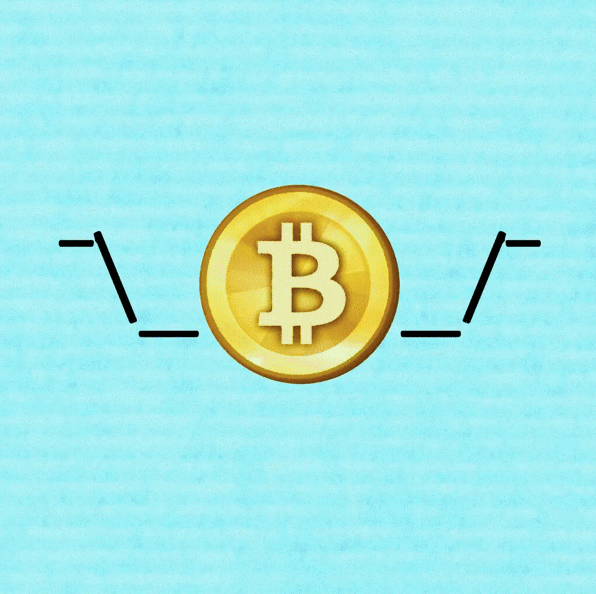IMAGE SOURCE
Recently in the news, Hillary Clinton, the former Democratic presidential candidate in the 2016 elections, warned that cryptocurrencies could destabilize countries and undermine the role of the US dollar as a reserve currency. Clinton said Russia and China are manipulating cryptos and the Biden Administration needs to regulate the cryptocurrency market. As bitcoin and other cryptocurrencies have now gone mainstream, financial regulators in Washington have started to express increasing concerns about bitcoin and other cryptocurrencies. Institutional investment managers like JPMorgan and Blackrock, which initially opposed bitcoin, are now helping their clients invest in cryptocurrencies. El Salvador in early September declared the cryptocurrency to be legal tender, allowing it to be used for payments. Last month the first bitcoin ETF was introduced on the New York Stock Exchange, allowing U.S. investors to speculate on Bitcoin prices without actually owning it. But so far US regulators have been more focused on regulating cryptocurrencies in the context of capital controls, securities fraud, and tax evasion. The US knows how privileged it is to have its currency function as a global reserve. As more powerful institutions and other countries adopt in cryptocurrencies, the US government will increasingly be pressured to take a stance on the new asset class. If bitcoin and other cryptocurrencies are here to stay, what will the future look like? The answer is complicated.
Kublai Khan created the first fiat money in the 13th century, money whose value is determined by the state declaring that it has value. It was the first money that was not backed by any commodity, such as gold, but just by the state’s authority. It was the beginning of money as we know it today.
But the problem with many new forms of money is that people are reluctant to adopt them.
Genghis Khan’s grandson took steps to ensure the currency’s validity, and if someone refused to use it or chose to pay with gold, silver, copper, iron bars, pearls, salt, coins, or any of China’s older forms of payment, they would be executed. Problem solved.
When you try to explain bitcoin to anyone, it’s immediately clear that cryptocurrencies are not money in the way most people think about money. The US dollar is a debt obligation of the US government. The value of the US dollar for the holder of that dollar is the real goods the dollar buys.
Today, the US dollar is the world’s reserve currency, which means it is widely used in international trade and is the preferred currency for central banks to hold as part of their foreign-exchange reserves. A lot of the world’s trade is invoiced in dollars, which means the contract is written in dollars and the payment is made in dollars. The US dollar makes up over 60% of the foreign currency reserves. When a bank wants to exchange Indian rupees to South African rand, it usually first converts rupees to dollars, then dollars to rand.
The dollar’s dominance and the US’s control of the world’s financial system is real. If cryptocurrencies were to replace the dollar, that power would be taken away.
If you’re a citizen of a country other than the United States, your main motivation is to locate the most flexible, dependable, and free currency. China would prefer not to be sanctioned in any way. India would prefer to freely trade oil with Iran. The European Union would prefer to instill trust in its financial system, and not be reliant on its connection with the US.
The Fed has begun to investigate a digital dollar to be used alongside regular paper money, as a result of the phenomenal growth of cryptocurrencies. The biggest push in this direction was Facebook’s effort to build a global payments network using crypto technology because it clearly demonstrated how the private sector could create a massive currency system outside government control.
While everyone is talking about bitcoin as a store of value, cryptocurrency was supposed to replace government-issued fiat currency in our daily lives. Plain and simple, the most important criterion for success is that cryptocurrencies end up being used in commercial transactions.
Can I buy my new car using Bitcoin? Not yet. Can I buy a new smartphone with it? Not yet. How about pizza on Friday night? Not yet. You will still have to use fiat currency for that.
If cryptocurrencies cannot be directly exchanged for real goods, they will not be very successful. Will we ever be able to? Will bitcoin and other cryptocurrencies replace dollars and other fiat currencies?
Although the idea of Bitcoin replacing the US dollar may sound far-fetched, some experts have begun to consider it more seriously. Both Ray Dalio and Peter Thiel have said that bitcoin has the potential to weaken the dollar’s dominance. Thiel also said that China may use it as a weapon to weaken America’s economic clout.
China is making an incredible effort to displace the dollar and has already launched a beta of the yuan’s digital version. As it preps to push the world to adopt the digital yuan as a reserve currency, it has banned all activity related to private cryptocurrencies. If it does manage to pull it off, China would get the control and power the US currently enjoys. But if China can’t attain that power, it could reverse the crypto bans it has imposed and consider the second-best case scenario, in which no one has that power.
So is the dollar’s status important? Yes, but the adoption of cryptocurrencies will eventually lead to the fall of the dollar. The question is how it falls.
Hillary Clinton’s call to regulate cryptocurrencies will likely not lead to any major change in the US government stance. It has already tried to move in this arena, but so far nothing major has happened. The fall of the dollar won’t necessarily be as terrible as it sounds and incredible things can happen when “you control the fire” and have a controlled fall.
Power comes in many forms. If history teaches us anything, fostering and supporting innovation can only unleash economic development, which in turn leads to more control and power. Three decades ago, the US supported the development of the Internet and it changed everything, fueling phenomenal economic growth. The companies that came out of that decision are valued in the billions and have disrupted every industry. Bitcoin is America’s next Internet, an open, transparent and decentralized, financial future.
Adopting crypto and decentralized finance the US would double down on democratic principles and reap the benefits of increased efficiencies in the process. A decentralized financial world is the antithesis of China’s centralized model. Being the leader of the decentralized revolution, the US would implicitly promote democracy, showcase the viability of a decentralized system, retain its leadership and maintain its control in the new and emerging financial world.
The coming years will be incredibly disruptive and the monetary balance of power will depend on who is willing to accept the challenge. It’s time to embrace the change and welcome the next revolution.
Recently in the news, Hillary Clinton, the former Democratic presidential candidate in the 2016 elections, warned that cryptocurrencies could destabilize countries and undermine the role of the US dollar as a reserve currency. Clinton said Russia and China are manipulating cryptos and the Biden Administration needs to regulate the cryptocurrency market. As bitcoin and other cryptocurrencies have now gone mainstream, financial regulators in Washington have started to express increasing concerns about bitcoin and other cryptocurrencies. Institutional investment managers like JPMorgan and Blackrock, which initially opposed bitcoin, are now helping their clients invest in cryptocurrencies. El Salvador in early September declared the cryptocurrency to be legal tender, allowing it to be used for payments. Last month the first bitcoin ETF was introduced on the New York Stock Exchange, allowing U.S. investors to speculate on Bitcoin prices without actually owning it. But so far US regulators have been more focused on regulating cryptocurrencies in the context of capital controls, securities fraud, and tax evasion. The US knows how privileged it is to have its currency function as a global reserve. As more powerful institutions and other countries adopt in cryptocurrencies, the US government will increasingly be pressured to take a stance on the new asset class. If bitcoin and other cryptocurrencies are here to stay, what will the future look like? The answer is complicated.
Kublai Khan created the first fiat money in the 13th century, money whose value is determined by the state declaring that it has value. It was the first money that was not backed by any commodity, such as gold, but just by the state’s authority. It was the beginning of money as we know it today.
But the problem with many new forms of money is that people are reluctant to adopt them.
Genghis Khan’s grandson took steps to ensure the currency’s validity, and if someone refused to use it or chose to pay with gold, silver, copper, iron bars, pearls, salt, coins, or any of China’s older forms of payment, they would be executed. Problem solved.
When you try to explain bitcoin to anyone, it’s immediately clear that cryptocurrencies are not money in the way most people think about money. The US dollar is a debt obligation of the US government. The value of the US dollar for the holder of that dollar is the real goods the dollar buys.
Today, the US dollar is the world’s reserve currency, which means it is widely used in international trade and is the preferred currency for central banks to hold as part of their foreign-exchange reserves. A lot of the world’s trade is invoiced in dollars, which means the contract is written in dollars and the payment is made in dollars. The US dollar makes up over 60% of the foreign currency reserves. When a bank wants to exchange Indian rupees to South African rand, it usually first converts rupees to dollars, then dollars to rand.
The dollar’s dominance and the US’s control of the world’s financial system is real. If cryptocurrencies were to replace the dollar, that power would be taken away.
If you’re a citizen of a country other than the United States, your main motivation is to locate the most flexible, dependable, and free currency. China would prefer not to be sanctioned in any way. India would prefer to freely trade oil with Iran. The European Union would prefer to instill trust in its financial system, and not be reliant on its connection with the US.
The Fed has begun to investigate a digital dollar to be used alongside regular paper money, as a result of the phenomenal growth of cryptocurrencies. The biggest push in this direction was Facebook’s effort to build a global payments network using crypto technology because it clearly demonstrated how the private sector could create a massive currency system outside government control.
While everyone is talking about bitcoin as a store of value, cryptocurrency was supposed to replace government-issued fiat currency in our daily lives. Plain and simple, the most important criterion for success is that cryptocurrencies end up being used in commercial transactions.
Can I buy my new car using Bitcoin? Not yet. Can I buy a new smartphone with it? Not yet. How about pizza on Friday night? Not yet. You will still have to use fiat currency for that.
If cryptocurrencies cannot be directly exchanged for real goods, they will not be very successful. Will we ever be able to? Will bitcoin and other cryptocurrencies replace dollars and other fiat currencies?
Although the idea of Bitcoin replacing the US dollar may sound far-fetched, some experts have begun to consider it more seriously. Both Ray Dalio and Peter Thiel have said that bitcoin has the potential to weaken the dollar’s dominance. Thiel also said that China may use it as a weapon to weaken America’s economic clout.
China is making an incredible effort to displace the dollar and has already launched a beta of the yuan’s digital version. As it preps to push the world to adopt the digital yuan as a reserve currency, it has banned all activity related to private cryptocurrencies. If it does manage to pull it off, China would get the control and power the US currently enjoys. But if China can’t attain that power, it could reverse the crypto bans it has imposed and consider the second-best case scenario, in which no one has that power.
So is the dollar’s status important? Yes, but the adoption of cryptocurrencies will eventually lead to the fall of the dollar. The question is how it falls.
Hillary Clinton’s call to regulate cryptocurrencies will likely not lead to any major change in the US government stance. It has already tried to move in this arena, but so far nothing major has happened. The fall of the dollar won’t necessarily be as terrible as it sounds and incredible things can happen when “you control the fire” and have a controlled fall.
Power comes in many forms. If history teaches us anything, fostering and supporting innovation can only unleash economic development, which in turn leads to more control and power. Three decades ago, the US supported the development of the Internet and it changed everything, fueling phenomenal economic growth. The companies that came out of that decision are valued in the billions and have disrupted every industry. Bitcoin is America’s next Internet, an open, transparent and decentralized, financial future.
Adopting crypto and decentralized finance the US would double down on democratic principles and reap the benefits of increased efficiencies in the process. A decentralized financial world is the antithesis of China’s centralized model. Being the leader of the decentralized revolution, the US would implicitly promote democracy, showcase the viability of a decentralized system, retain its leadership and maintain its control in the new and emerging financial world.
The coming years will be incredibly disruptive and the monetary balance of power will depend on who is willing to accept the challenge. It’s time to embrace the change and welcome the next revolution.

Ilias Louis Hatzis
Ilias Louis Hatzis is the Founder & CEO at Mercato Blockchain Corporation AG.
Ilias Louis Hatzis is the founder and CEO at Kryptonio wallet. Create your wallet in less than a minute, without seed phrases, private keys, passwords or documents. Keep your bitcoin and digital assets always secure and recoverable: https://kryptonio.com
I have no positions or commercial relationships with the companies or people mentioned. I am not receiving compensation for this post.
Ilias Louis Hatzis is the founder and CEO at Kryptonio wallet. Create your wallet in less than a minute, without seed phrases, private keys, passwords or documents. Keep your bitcoin and digital assets always secure and recoverable: https://kryptonio.com
I have no positions or commercial relationships with the companies or people mentioned. I am not receiving compensation for this post.
Autres articles
-
Reach Capital - Internship - Product Specialist Private Wealth Solutions - Paris
-
Reach Capital - Internship - Project Management Fundraising - Paris
-
Robinhood Crypto chouchoute un peu plus ses clients européens
-
Société Générale fait confiance à CLS pour ses transactions "Cross Currency Swap"
-
SumUp dépasse le milliard de transactions annuelles

















